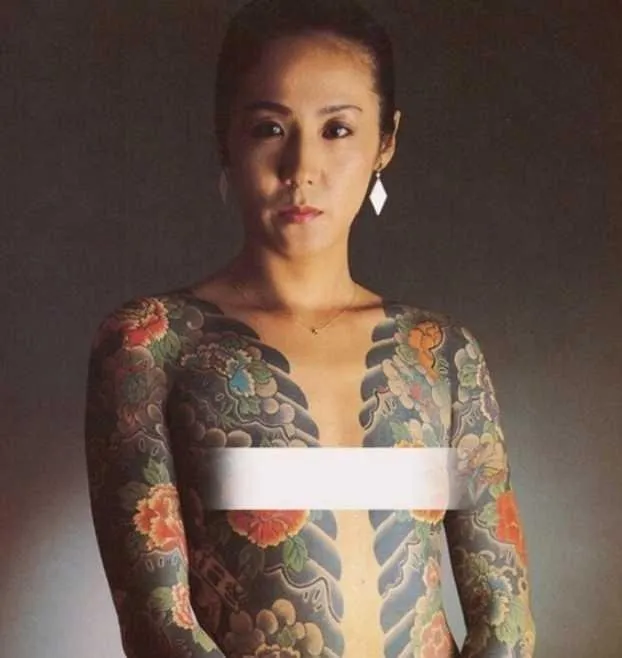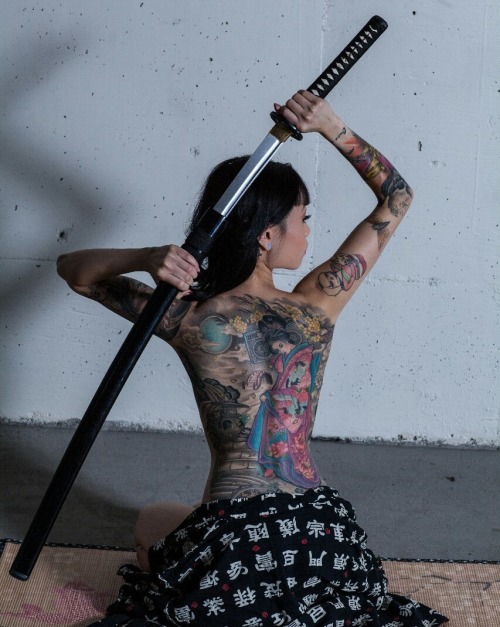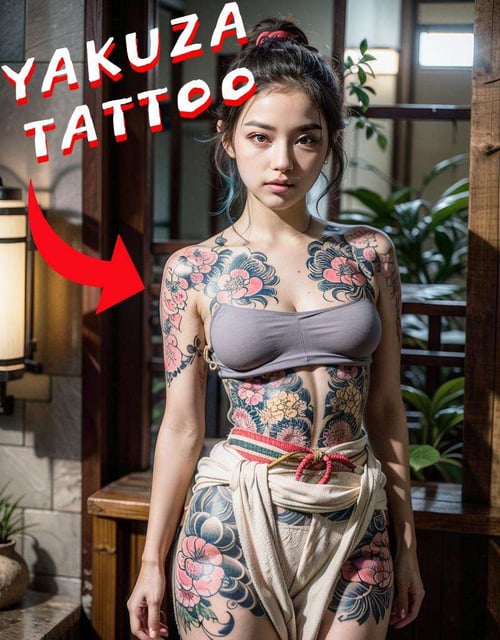Wearers of traditional tattoos frequently keep their art secret, as tattoos are still seen as a sign of criminality in Japan, particularly by older people and in the work place. Many yakuza and other criminals themselves now avoid tattoos for this very reason.While tattoos are not illegal, they can prevent people from getting the full Japanese experience. When using public transportation in Japan, such as trains, tourists with visible tattoos will want to keep in mind that their ink may be offensive to some of the locals.YAKUZA TATTOOS were very common in traditional Japanese culture. Today, anybody can have them as well. Check out the most famous designs and what they mean.
What is a Nagasode : Nagasode-full arm tattoo
Full arm tattoos or “sleeves” are called such because they cover an area the same as a shirt sleeve would cover. There are two types of Nagasode. Kubu- which ends at the wrist bone and Tobu- which stops just above the hand.
Can a woman be a Yakuza
The yakuza is dominated by men and leaves only informal roles to women. Typically a woman involved with the yakuza might be an anesan, a boss' wife who takes care of young affiliates and mediates between them and her husband. Wives and partners of the members support the group in a peripheral way.
Can Yakuza show their tattoos in public : As tattoos are so related to the Yakuza mafia, in Japan, they are prohibited from being displayed in some public places, such as onsen, which are spas, or in gyms and other similar places.
If you are inked and headed to Japan, here are some things you should know: 1) Expect to completely cover tattoos at any pool, gym and most water parks and beaches. Tattoos are generally outright banned in Japan in these areas and there are often clear signs stating this. But before we dive in, why these anti-tattoo rules Well, it's not just the onsen; it's unacceptable to flash your body art in gyms, swimming pools, and even at the beach in Japan.
Who wears hakama
As hakama are one of the most important parts of traditional male formal dress, sumo wrestlers are often seen wearing hakama when attending appropriately formal functions. In addition to martial artists, hakama are also part of the everyday wear of Shinto kannushi, priests who maintain and perform services at shrines.throwing
The word "makura" means "pillow", "nage" means "throwing". There were no rules for Makura-Nage, but today some Japanese ryokan hold Makura-Nage Games (まくら投げ大会) for advertisement. In many anime and manga, a Makura-Nage scene creates a nostalgic atmosphere when describing children.They refer to each other as family members—fathers and elder and younger brothers. The yakuza is populated almost entirely by men and the very few women who are acknowledged are the wives of bosses, who are referred to by the title ane-san (姐さん, older sister). Sukeban reportedly first appeared in Japan during the 1960s, presenting themselves as the female equivalent to the banchō gangs, which were composed mostly of men. During the 1970s, as banchō gangs began to die out, sukeban girl gangs began to rise in number.
Can a woman be a yakuza : The yakuza is dominated by men and leaves only informal roles to women. Typically a woman involved with the yakuza might be an anesan, a boss' wife who takes care of young affiliates and mediates between them and her husband. Wives and partners of the members support the group in a peripheral way.
How do yakuza decide their tattoo : The body suits usually have one major piece (on the back), which is chosen by the customer. Then the rest of the details are added by the horishy (the tattoo master). A lot of times, the client will discuss with the tattoo master the meaning and symbolism of each scene and deity, before picking a preferred one.
Are foreigners with tattoos allowed in Japan
Of course, some places require you to cover your tattoos up, which I'll provide some tips for later, but it's safe to say that you'll be generally fine living in Japan with tattoos as a foreigner in Japan today. Tattoo: Almost all of gyms in Japan do not like to see Tatoo no matter how small it is. In some cases, they would ask you to leave if you have one. So please make sure to hide it with long sleeve shirts and pants if you have one.The Japanese have perfected the art of onsen, or hot spring baths, for centuries. Traditionally, men and women would bathe together in the same facility, but these days the baths are segregated by gender. Today, konyoku (mixed-gender onsen) are hard to find, with places like Tokyo having bans on such establishments.
Can females wear hakama : Women typically wear hakama just below the bust line, while men wear them at the waist.
Antwort Do female yakuza get tattoos? Weitere Antworten – Does everyone in the Yakuza have tattoos
Wearers of traditional tattoos frequently keep their art secret, as tattoos are still seen as a sign of criminality in Japan, particularly by older people and in the work place. Many yakuza and other criminals themselves now avoid tattoos for this very reason.While tattoos are not illegal, they can prevent people from getting the full Japanese experience. When using public transportation in Japan, such as trains, tourists with visible tattoos will want to keep in mind that their ink may be offensive to some of the locals.YAKUZA TATTOOS were very common in traditional Japanese culture. Today, anybody can have them as well. Check out the most famous designs and what they mean.
What is a Nagasode : Nagasode-full arm tattoo
Full arm tattoos or “sleeves” are called such because they cover an area the same as a shirt sleeve would cover. There are two types of Nagasode. Kubu- which ends at the wrist bone and Tobu- which stops just above the hand.
Can a woman be a Yakuza
The yakuza is dominated by men and leaves only informal roles to women. Typically a woman involved with the yakuza might be an anesan, a boss' wife who takes care of young affiliates and mediates between them and her husband. Wives and partners of the members support the group in a peripheral way.
Can Yakuza show their tattoos in public : As tattoos are so related to the Yakuza mafia, in Japan, they are prohibited from being displayed in some public places, such as onsen, which are spas, or in gyms and other similar places.
If you are inked and headed to Japan, here are some things you should know: 1) Expect to completely cover tattoos at any pool, gym and most water parks and beaches. Tattoos are generally outright banned in Japan in these areas and there are often clear signs stating this.

But before we dive in, why these anti-tattoo rules Well, it's not just the onsen; it's unacceptable to flash your body art in gyms, swimming pools, and even at the beach in Japan.
Who wears hakama
As hakama are one of the most important parts of traditional male formal dress, sumo wrestlers are often seen wearing hakama when attending appropriately formal functions. In addition to martial artists, hakama are also part of the everyday wear of Shinto kannushi, priests who maintain and perform services at shrines.throwing
The word "makura" means "pillow", "nage" means "throwing". There were no rules for Makura-Nage, but today some Japanese ryokan hold Makura-Nage Games (まくら投げ大会) for advertisement. In many anime and manga, a Makura-Nage scene creates a nostalgic atmosphere when describing children.They refer to each other as family members—fathers and elder and younger brothers. The yakuza is populated almost entirely by men and the very few women who are acknowledged are the wives of bosses, who are referred to by the title ane-san (姐さん, older sister).

Sukeban reportedly first appeared in Japan during the 1960s, presenting themselves as the female equivalent to the banchō gangs, which were composed mostly of men. During the 1970s, as banchō gangs began to die out, sukeban girl gangs began to rise in number.
Can a woman be a yakuza : The yakuza is dominated by men and leaves only informal roles to women. Typically a woman involved with the yakuza might be an anesan, a boss' wife who takes care of young affiliates and mediates between them and her husband. Wives and partners of the members support the group in a peripheral way.
How do yakuza decide their tattoo : The body suits usually have one major piece (on the back), which is chosen by the customer. Then the rest of the details are added by the horishy (the tattoo master). A lot of times, the client will discuss with the tattoo master the meaning and symbolism of each scene and deity, before picking a preferred one.
Are foreigners with tattoos allowed in Japan
Of course, some places require you to cover your tattoos up, which I'll provide some tips for later, but it's safe to say that you'll be generally fine living in Japan with tattoos as a foreigner in Japan today.

Tattoo: Almost all of gyms in Japan do not like to see Tatoo no matter how small it is. In some cases, they would ask you to leave if you have one. So please make sure to hide it with long sleeve shirts and pants if you have one.The Japanese have perfected the art of onsen, or hot spring baths, for centuries. Traditionally, men and women would bathe together in the same facility, but these days the baths are segregated by gender. Today, konyoku (mixed-gender onsen) are hard to find, with places like Tokyo having bans on such establishments.
Can females wear hakama : Women typically wear hakama just below the bust line, while men wear them at the waist.